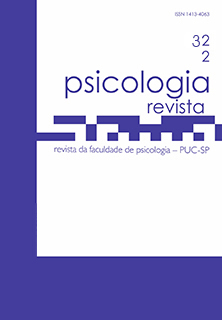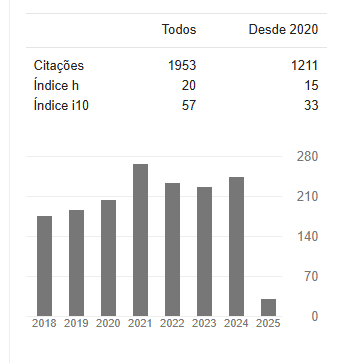Sex, age and practice time influence the development of life skills in adapted sports practitioners?
DOI:
https://doi.org/10.23925/2594-3871.2023v32i2p418-434Keywords:
Sport, Positive Development, Young, Adapted SportAbstract
This cross-sectional study investigated the perception of life skills development among 90 young athletes with disabilities participating in individual and team sports, with an average age of 17.31 ± 1.35 years and an average practice time of 8.50 ± 5.38 months, including both genders (10 boys and 78 girls). The instruments used included a sociodemographic questionnaire in order to characterize the sample and the Life Skills in Sports Scale (P-LSSS) to assess life skills. Data analysis was conducted using Kolmogorov-Smirnov tests, independent t-tests, and Pearson correlation (p <0.05). The results demonstrated a positive correlation between age and teamwork skills (r = 0.25), goal setting (r = 0.24) and social skills (r = 0.22). Male athletes scored higher in teamwork dimensions (p = 0.001), goal setting (p = 0.003), social skills (p =<0.001), problem-solving (p <0.001) and emotional skills (p = 0.005). Older athletes had higher scores in the teamwork subscale (p = 0.039). There was no significant difference (p <0.05) in relation to practice time. In conclusion, age and gender are associated with the development of life skills in participants in adapted sports.
References
Ato, M., Lopez, J. J., & Benavente, A. (2013). A classification system for research designs in psychology. Anales de Psicología, 29(3), 1038-1059.
Beltrame, A. L. N. (2016). Centro de iniciação desportiva paralímpica no Distrito Federal: um estudo na ótica da educação inclusiva. Educação, 10 (1), 1-97.
Borgmann, T., & de Almeida, J. J. G. (2015). Esporte paralímpico na escola: revisão bibliográfica. Movimento, 21(1), 53-68.
Bruner, M. W., Balish, S. M., Forrest, C., Brown, S., Webber, K., Gray, E., ... & Shields, C. A. (2017). Ties that bond: Youth sport as a vehicle for social identity and positive youth development. Research quarterly for exercise and sport, 88(2), 209-214.
Camiré, M., & Santos, F. (2019). Promovendo o desenvolvimento positivo dos jovens e habilidades para a vida no esporte juvenil: desafios e oportunidades em meio ao aumento da profissionalização. Journal of Sport Pedagogy & Research , 5 (1), 27-34.
Ciocanel, O., Power, K., Eriksen, A., & Gillings, K. (2017). Effectiveness of positive youth development interventions: A meta-analysis of randomized controlled trials. Journal of youth and adolescence, 46(3), 483-504.
Cohen, J. (2003). A power primer.
Cronin, L., Marchant, D., Allen, J., Mulvenna, C., Cullen, D., Williams, G., & Ellison, P. (2019). Students’ perceptions of autonomy-supportive versus controlling teaching and basic need satisfaction versus frustration in relation to life skills development in PE. Psychology of Sport and Exercise, 44, 79-89.
Cronin, L., Marchant, D., Johnson, L., Huntley, E., Kosteli, M. C., Varga, J., & Ellison, P. (2020). Life skills development in physical education: A self-determination theory-based investigation across the school term. Psychology of Sport and Exercise, 49 (2), 101- 111.
Cronin, L. D., & Allen, J. (2017). Development and initial validation of the Life Skills Scale for Sport. Psychology of Sport and Exercise, 28 (2), 105-119.
Cronin, L. D., & Allen, J. (2018). Examining the relationships among the coaching climate, life skills development and well-being in sport. International journal of sports science & coaching, 13(6), 815-827.
Duarte, E., & Santos, T. D. (2003). Adaptação e inclusão. DUARTE, E; LIMA, SMT Atividade física para pessoas com necessidades especiais: experiências e intervenções pedagógicas. Rio de Janeiro: Guanabara Koogan.
Freire, G. L. M., da Silva, A. A., de Moraes, J. F. V. N., Costa, N. L. G., de Oliveira, D. V., & do Nascimento Junior, J. R. A. (2021). Do age and time of practice predict the development of life skills among youth futsal practitioners? Cuadernos de Psicología del Deporte, 21(1), 135-145.
Freire, G. L. M., de Moraes, J. F. V. N., de Oliveira, D. V., da Silva Xavier, S. E., Ribeiro, L. C., & do Nascimento Junior, J. R. A. (2020a). Qualidade Do Relacionamento Com O Treinador E Resiliência De Atletas Paralímpicos De Atletismo E Natação. Psicologia e Saúde em debate, 6(1), 165-177.
Freire, G. L. M., Souza Neto, A. C. de, da Cruz Santos, M., Tavares, J. E. T., de Oliveira, D. V., & do Nascimento Junior, J. R. A. (2020b). Desenvolvimento de habilidades para vida em adolescentes praticantes de esportes individuais. Research, Society and Development, 9(8), 90-99.
Gould, D., & Carson, S. (2008). Life skills development through sport: Current status and future directions. International review of sport and exercise psychology, 1(1), 58-78.
Gucciardi, D. F. (2011). The relationship between developmental experiences and mental toughness in adolescent cricketers. Journal of Sport and Exercise Psychology, 33(3), 370-393.
Hair, J. F., Risher, J. J., Sarstedt, M., & Ringle, C. M. (2019). When to use and how to report the results of PLS-SEM. European business review.
Junior, J. R. A. N., Freire, G. L. M., Granja, C. T. L., Barros, N. P., Oliveira, D. V., & Trevisan, L. G. (2021). The role of resilience on motivation among Brazilian athletics and swimming parathletes. Journal of Physical Education, 1(32), 50-59.
Kiuppis, F. (2018). Inclusion in sport: Disability and participation.
Malta, M., Cardoso, L. O., Bastos, F. I., Magnanini, M. M. F., & Silva, C. M. F. P. D. (2010). STROBE initiative: guidelines on reporting observational studies. Revista de saude publica, 44, 559-565.
Malta, M., Cardoso, L. O., Bastos, F. I., Magnanini, M. M. F., & Silva, C. M. F. P. D. (2010). STROBE initiative: guidelines on reporting observational studies. Revista de saude publica, 44, 559-565.
Nascimento-Junior, J. R. A. D., Fortes, L. D. S., Freire, G. L. M., Oliveira, D. V. D., Fiorese, L., & Cronin, L. D. (2020). Cross-Cultural Adaptation and Psychometric Properties of the Portuguese Version of the Life Skills Scale for Sport. Measurement in Physical Education and Exercise Science, 24(1), 11-24.
Nascimento Junior, J. R. A. D., Freire, G. L. M., Quinaud, R. T., Oliveira, D. V. D., & Cronin, L. D. (2021). Life Skills Development Through Sport in Brazil: A Study Based on Self-Determination Theory. Perceptual and Motor Skills, 1(1), 110-127.
Schmitt, B. D., Bertoldi, R., Ledur, J. A., Begossi, T. D., & Mazo, J. Z. (2017). Produção científica sobre esporte adaptado e paralímpico em periódicos brasileiros da educação física. Kinesis, 35(3), 1-15.
Vella, S. A., Oades, L. G., & Crowe, T. P. (2013). The relationship between coach leadership, the coach–athlete relationship, team success, and the positive developmental experiences of adolescent soccer players. Physical education and sport pedagogy, 18(5), 549-561.
Downloads
Published
How to Cite
Issue
Section
License
Copyright (c) 2023 Gabriel Lucas Morais Freire, Carina Cléures de Moura Albuquerque, Lenamar Fiorese, Sherdson Emanoel da Silva Xavier, Yara Lucy Fidelix, José Roberto Andrade do Nascimento Junior

This work is licensed under a Creative Commons Attribution 4.0 International License.














